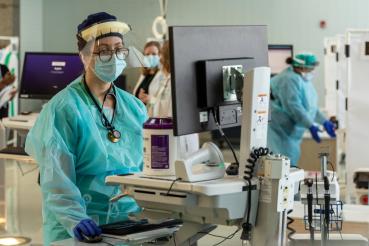By Carl Bergetz, JD
In the past week, amidst the unprecedented COVID-19 crisis in public health across the globe, a remarkable change happened in health law here in Illinois.
On April 1, Gov. J.B. Pritzker issued Executive Order 2020-19 providing broad civil liability immunity for hospitals, doctors, nurses and other health care professionals on the front lines of the battle against the pandemic, protecting them as they provide care to patients in response to the COVID-19 outbreak in Illinois.
This order was in addition to numerous other changes to health care laws and regulations that the governor and his state agencies have recently issued so that health care systems can function better during the crisis—e.g., expediting licensure to enable professionals to provide help more quickly and requiring private insurers to cover the costs of telehealth visits to free up capacity at hospitals and reduce the risk of transmission.
But the governor’s order on civil liability really should be heralded as singular. To date, this order provides the broadest such protection for health care facilities and providers, including a recently enacted order by New York Gov. Andrew Cuomo, where, to date, the crisis has hit hardest in America. The protection of Pritzker’s order could not be more necessary for this time and for this state.
Stepping up for health care providers
Health care workers normally function under intense stress and uncertainty, but never more so than at this moment. Resources and personnel are stretched thin; providers must be redeployed to non-traditional areas; hospitals are expanding capacity wherever it can be found. And while providing care and performing difficult procedures in this changing environment, these workers are forced to make stressful ethical decisions, answering questions about the use of limited clinical supplies and equipment, the risks of exposure in certain settings, or the redeployment of providers in new locations.
Costs and benefits can be weighed in a consequentialist calculation, but in the chaos of a crisis, such a balancing act is not easy and sometimes rendered impossible. Universal principles could help, but crisis standards of care that have the force of law do not currently exist and conventional standards of care are inapplicable to this pandemic. We certainly don’t want cash-strapped hospitals and private physicians to add legal concerns to this calculus. As members of the public, we every day recognize and applaud the heroic efforts of these health care providers. We trust their judgment, and the governor is doing the same thing.
And in that, we are in a reasonably good position, as the vast majority of physicians and nurses have spent years making bioethical decisions in the moment. Their routine of incident management has the effect of habituating good character traits and virtues. In the crucible of crisis, with time being of the essence and life on the line, character is what gets us through the fog and to a good decision. Of course, our health care professionals aren’t perfect in their decision-making; no one is. But few professionals are as battle-tested as they are, inculcated with such virtues, shift-in and shift-out. And in the case of COVID, there is no conflict concerning some financial incentive. Hospitals and care providers will be undergoing significant financial harm due to the pandemic. The recently enacted federal CARES Act may help, but we have no way to be sure as the details are not yet apparent. This is one of the clearest examples of the medical community stepping forward consistent with their professional oath and personal and institutional missions. We should respond in kind.
What they do not need is a court-martial in the middle of the battlefield. And moreover, after we emerge from this crisis—and we will largely because of them—health care providers don’t need to be second-guessed over decisions made in the fog of this war. In an irrational medical-malpractice environment like Illinois, that is more than just a possibility. That is a palpable source of fear and stress.
Opportunity for progress, post-COVID
Illinois stands out in the nation for its problematic liability environment. In 2019, the U.S. Chamber Institute for Legal Reform commissioned Harris Poll to conduct a survey of the fairness of liability systems around the country. The survey ranked Illinois last and found Cook County to have the “least fair and reasonable” litigation environment. Many reasons account for such poor rankings, but one contributing factor is likely the medical-malpractice situation. A 2013 study conducted by the American Academy of Emergency Medicine lists Illinois as the worst state for medical liability. Yet Illinois has refused to join the vast majority of states in embracing medical-malpractice reform, including reasonable limits on non-economic damages. From red states like Texas to blue states like Massachusetts, and throughout the neighboring states of Michigan, Indiana and Wisconsin, reasonable limits have been placed on non-economic damages—such as pain and suffering and emotional distress.
Illinois instead forces health care professionals to do their work and make their decisions with no limitations on verdicts—exposing them to the threat of excessive awards. Like other states, reasonable limits in Illinois would provide patients with a reasonable framework for justice, accounting for situations where a wrong must be righted, while also providing hospitals, doctors and nurses with some measure of confidence and certainty in their work—instead of fear and uncertainty—so that they will not lose their livelihood or have to withdraw from practice because of excessive and punitive jury awards.
In the current crisis, our front line health care workers need some measure of confidence and certainty—or at least a bit less stress and worry. Pritzker understood that, and he should be commended for his executive order on liability and for his leadership during this pandemic. For once in the realm of legal reform, other states should follow Illinois’ lead on these emergency orders and regulatory changes.
Of course, these changes are temporary. When this pandemic ebbs, we must not forget why such protection was so desperately needed on an emergency basis. Some measure of these changes should be considered as a foundation for broader health law and policy reform in Illinois. After the crisis, we need to remember our health care heroes and give them a more rational, more moderate and more certain legal environment to pursue their mission of protecting and improving the health of all Illinoisans.
Carl Bergetz is general counsel and chief legal officer for Rush University System for Health and general counsel for Rush University Medical Center.



